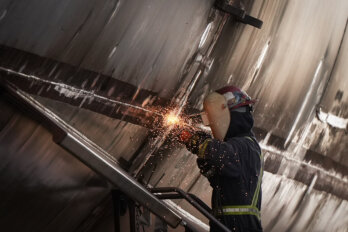About a month ago, I was at a crowded family gathering, where people talked over one another while tucking into plates of lasagna. When the person sitting next to me raised US president Donald Trump’s tariffs and threats to annex Canada, we made some cynical jokes before she said, softly, “It’s starting to get scary.” I knew what she meant, and hearing it out loud felt validating.
For a long time, most people I spoke to treated Trump’s “fifty-first state” threat like a joke or brushed it off entirely. Two American friends assured me it would never happen, one saying it wouldn’t benefit the Republicans electorally since Canada would vote Democrat. I pointed out that a scenario in which the US illegally annexes Canada might not be one where normal voting practices apply. But my friend wasn’t really having it. Meanwhile, few Canadians seemed eager to discuss it seriously at the time. None of us, I think, wanted to entertain the possibility of the US turning its imperialist ambitions toward Canada.
You’ll sometimes hear the argument that talking about Trump’s threat helps normalize it. The approach echoes a broader ethos of how the media might approach Trump’s other imperialist threats, which he’s also levelled at Gaza, Panama, and Greenland. Recently, for instance, Jelani Cobb, dean of Columbia University’s journalism school, said in a Q&A with the Reuters Institute for the Study of Journalism that the media should treat Trump’s threats to take over Gaza “the way we would treat a tantrum from a child. When your kids are little and they fall out on the floor, you just ignore it. You don’t want to reward that behaviour. Otherwise, you get more of it. The key thing is policy. So unless [Trump] shows up with a blueprint showing how they’re going to build condos in Gaza, then it’s just more talk from him.”
I know covering Trump isn’t easy, and Cobb concedes there’s no simple approach. He also acknowledges his response is a “gut feeling” and by no means definitive. But if the media, and the public sphere more generally, treat Trump like a kid having a tantrum, doesn’t that give him a kind of tacit permission to act like one? And when it comes to Trump’s annexation threats against Canada, especially considering the immense power he wields, I wonder if a reluctance to engage isn’t just a strategic approach but also an aversion to the genuine fear and anxiety that come with recognizing its significance.
Because really, hasn’t Trump already normalized the threat by virtue of his position? How else should one interpret an authoritarian president of the United States posting two maps on Truth Social, his social media platform, with no Canada, just the US stretching across the provinces and territories?
And don’t American politicians and mainstream media outlets normalize the threat by refusing to speak out against it, some even entertaining the idea? In this way, I see the approach not unlike how Democratic elites and presidential candidate Kamala Harris responded to Trump’s racist lies about Haitian immigrants eating pets in Springfield, Ohio, during the one and only US presidential debate: it was laughed off, seen as a joke, turned into a meme. Now, Trump has ended temporary protection status for half a million Haitians living in the US.
Although Trump’s threats to annex Canada, or Gaza, or Panama, or Greenland—which he’s vowed to take “one way or the other”—might be shocking, they’re a particular culmination of the fascistic “Make America Great Again” project. The slogan that’s gone on to become a vitriolic ideology harkens back to a fictitious past where the US was strong and life for (white) Americans was good. I’ll be the first to admit that I thought Trump would stay focused on domestic issues. International allies and causes would suffer, and a diverse range of people all over the world would face harm, sure, but a new phase of old-fashioned American imperialism seemed far-fetched.
I should’ve known better. If the goal is to go back to an unspecified time when America was “great,” US history is rife with examples of the country seizing sovereign territory to benefit its interests. First and foremost, the target was Indigenous lands, seized through violence or sometimes purchased from other foreign powers like Russia or France. The Mexican-American War from 1846 to 1848 added large parts of the west and southwest to American jurisdiction. Later, the US set its sights on overseas territories with a coup in Hawaii in 1893, the invasion of Puerto Rico, and the acquisition of the Philippines from Spain, to name a few. Even today, the American empire includes a massive collection of overseas military bases.
And so, when Trump talks of wanting to annex a territory, it’s yet another chapter in this devastating tradition. The US was a colonial project from its inception; it remains one in 2025. The shock some of us might feel in Canada is, I think, the naive belief that American imperial sights wouldn’t turn here.
And maybe they won’t. Who knows what Trump will actively pursue. Who knows how myriad historical contingencies will shape what happens in this unrecognizable world we now live in.
Still, the fact that Trump has broadened his “America First” ideology to include explicitly imperialist ambitions means Canadians must confront a public discourse that still seems reluctant, at times, to take these threats seriously. It means confronting our “normalcy” or “status quo” bias, an idea recently deployed by epidemiologist Adam Kucharski, who defines it as “the tendency to prefer that the existing state of affairs continue rather than change.”
Comparing the democratic unravelling of the US to the early days of the COVID-19 pandemic in his Substack, “Understanding the Unseen,” Kucharski writes, “Both before and after the pandemic emerged, there was widespread reluctance to acknowledge the reality of such a crisis . . . it now feels like many journalists and public figures struggle to grasp that something new and disasterous [sic] is unfolding in the US. In many cases, I suspect this reluctance stems from an inability—or unwillingness—to face the reality of what’s happening.” In his mind, “COVID and the US situation both represent a crucial variant of this bias, where the status quo has already collapsed, but people still act as if it remains intact.”
When the reality is scary and unimaginable, it’s easy to understand why so many cling to a vision of normal that precedes it. Kucharski notes there’s also a tendency to believe that acknowledging a crisis risks making it seem inevitable. But there’s danger in this, as Kucharski stresses. “Because individuals haven’t fully processed this shift, they default to inaction,” he writes, “clinging to the belief that things will return to ‘normal’ instead of recognizing that a fundamental change has already occurred.”
Many have pointed out how such a “status quo” bias restricts action on the climate emergency. I fear this bias also paralyzes how some Canadians view an emerging national crisis. Although there’s more discussion of Trump’s threats nowadays, including what it would mean for Indigenous nations, the continuity of Canadian sovereignty is often taken for granted. (There’s also an argument that Canada has already lost part of its economic independence, thanks to the neoliberal obsession with free trade.) Politicians give us assurances that Canada will never be a part of the US, but with few concrete explanations of how they would ensure that.
This isn’t an argument for more military spending or waving the flag and singing the anthem. It goes beyond “Buying Canadian” and boycotting American products. It’s about coming to terms with Trump’s authoritarian takeover of the US and the inherent risk this poses to Canadian sovereignty and democratic values, notwithstanding all the back and forth on tariffs.
“Whatever derangement currently occupies conservative American politics is, at least, something of very real consequence: the minority groups they want to legislate out of every facet of society, the books they want to ban, the mechanisms of democracy they want to subvert—none of it is hypothetical,” writes Omar El Akkad in his brilliant new book, One Day, Everyone Will Have Always Been Against This. I would add Trump’s threats to annex Canada to this list. After all, for a chronic liar, Trump can sometimes tell you exactly what he wants to do. His reasons might change—the scourge of fentanyl one day, American banks’ access to Canada another—but the threat stays the same.
This is the situation Canada faces with what was, until very recently, its closest ally and neighbour, arguably the most powerful country in the world. We’re now in a federal election dominated by Trump and his tariffs, but it’s one in which the scope of the dangers posed to Canada still don’t seem to have fully permeated. Leading candidates Mark Carney and Pierre Poilievre claim they’re the ones who can keep “Canada Strong” and put “Canada First.” But so far, many of the actions proposed by the candidates have focused on tax cuts and the economy, though Carney has recently acknowledged Canada’s traditional relationship with the US “is over.”
Politicians like to acknowledge it’s tough now, but they promise us that if we elect them, better days are ahead. However, focusing on Trump via the economy doesn’t change the fact that the US has turned authoritarian and its president now speaks of wanting to take over Canada.
Other countries, like Sweden, Finland, Norway, and France, which have a history of invasion or threats of invasion from powerful neighbouring countries, have been bracing citizens for this unstable geopolitical moment by circulating emergency preparedness and survival manuals. These contain guidance on armed conflicts, security threats, climate disasters, and more. Yet here in Canada, the very idea of receiving such a manual seems unthinkable—an admission of weakness, perhaps, not a wise precaution.
There’s no question in my mind that Trump trying to forcibly annex Canada is, at the very least, a distinct possibility. It’s time to start considering the worst, not just hoping for the best.





